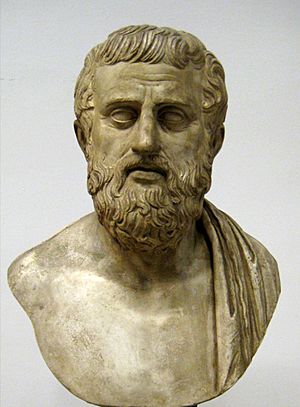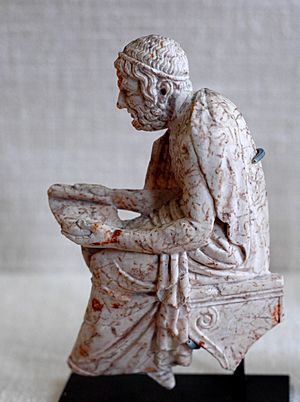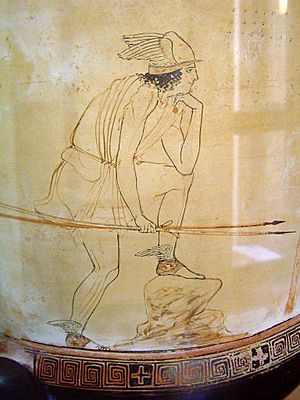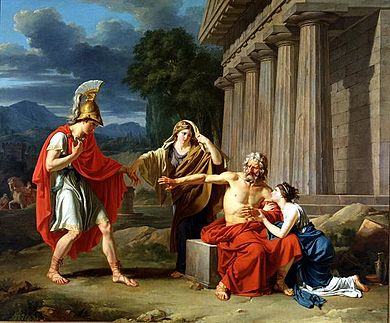Sophocles facts for kids
Quick facts for kids
Sophocles
|
|
|---|---|
 |
|
| Born | 497/496 BC Colonus, Attica |
| Died | 406/405 BC (aged 90–92) Athens |
| Occupation | Tragedian |
| Genre | Tragedy |
| Notable works |
|
Sophocles (born around 497/6 BC, died in winter 406/5 BC) was a very important ancient Greek writer. He was one of the three greatest writers of tragedies, which are serious plays with sad endings. His plays were written around the same time as those by Aeschylus and Euripides.
Sophocles wrote more than 120 plays. However, only seven of them have survived completely. These are Ajax, Antigone, Women of Trachis, Oedipus Rex, Electra, Philoctetes, and Oedipus at Colonus.
For nearly 50 years, Sophocles was the most famous playwright in Athens. He won many awards in play competitions. These contests happened during big religious festivals like the Lenaea and the Dionysia. He entered 30 competitions and won 24 of them. He never finished lower than second place!
Sophocles made big changes to how plays were performed. Most importantly, he added a third actor to the stage. Before him, plays usually only had two actors and a chorus. Adding a third actor meant more characters could talk to each other. This made the story more exciting and helped the characters develop more deeply.
Contents
Sophocles' Life Story
Sophocles was the son of Sophillus. His family was wealthy. He was born in a small community called Hippeios Colonus in Attica. This place later became the setting for one of his plays. He was probably born a few years before the famous Battle of Marathon in 490 BC. The exact year is thought to be 497 or 496 BC.
Sophocles came from a rich family. His father made armor. He received a very good education. His first big success happened in 468 BC. He won first prize at the Dionysia festival. He even beat Aeschylus, who was the top playwright at the time.
In 480 BC, Sophocles was chosen for a special honor. He led a paean, which was a song of praise to a god. This song celebrated the Greek victory over the Persians at the Battle of Salamis.
Sophocles was also involved in the government of Athens. In 443/2 BC, he helped manage the city's money. He was one of the treasurers of Athena. Later, in 441 BC, he was elected as one of the ten generals of Athens. These generals were important leaders. He served with Pericles during a military campaign against the island of Samos.
In 420 BC, Sophocles was chosen to welcome a statue of Asclepius into his home. Asclepius was the god of healing. This happened when the worship of Asclepius was new in Athens. For this, he was later called Dexion, meaning "receiver."
Sophocles lived a long life. He died at about 90 or 91 years old. This was in the winter of 406/5 BC. He saw many important events in his lifetime. These included the Greek victory in the Persian Wars and the long Peloponnesian War.
There are some interesting stories about his death. One story says he died trying to say a long sentence from his play Antigone without taking a breath. Another story says he choked on grapes. A third story claims he died of happiness after winning his last play competition.
One of his sons, Iophon, and a grandson, also named Sophocles, became playwrights too.
Sophocles' Plays and Impact
Sophocles is famous for changing how plays were written and performed. He made characters more complex and real. He is also credited with adding a third actor. This reduced the importance of the chorus. The chorus used to be very central to the story. With more actors, there were more chances for characters to have arguments and develop.
After Aeschylus died in 456 BC, Sophocles became the most important playwright in Athens. He won many competitions. Foreign rulers invited him to visit their courts. But Sophocles never left Athens, unlike other famous playwrights.
Aristotle, a famous Greek philosopher, wrote a book called Poetics. In this book, he used Sophocles' play Oedipus Rex as the best example of a perfect tragedy.
Only two of Sophocles' seven surviving plays can be dated for sure. Philoctetes was written in 409 BC. Oedipus at Colonus was performed in 401 BC, after Sophocles had died. His grandson put it on stage.
Most of Sophocles' plays show a sense of fatalism. This means characters often feel like their lives are controlled by fate. His plays also show the beginnings of Socratic logic. This was a new way of thinking and asking questions.
The Theban Plays
Sophocles' most famous plays are often called the Theban plays. There are three of them: Oedipus Rex (also known as Oedipus the King), Oedipus at Colonus, and Antigone. All three plays are about the city of Thebes and its rulers, especially King Oedipus.
These plays are often published together. But Sophocles wrote them many years apart for different festival competitions. They are not a true trilogy, which would be three plays meant to be performed as one continuous story. They even have some small differences in their stories. Sophocles also wrote other plays about Thebes, but only small pieces of them remain.
Main Stories of the Theban Plays
The three plays tell the sad story of Oedipus. He unknowingly kills his father and marries his mother. Because of this, his family is cursed for three generations.
In Oedipus Rex, Oedipus is the main character. His parents, Laius and Jocasta, tried to kill him when he was a baby. They did this to stop a prophecy from coming true. But a servant saved him. Oedipus was adopted by a childless couple. Later, Oedipus learned about the prophecy from the Delphic Oracle. It said he would kill his father and marry his mother. He tried to run away from his fate.
On his journey, Oedipus met a man and his servants. They fought, and Oedipus killed the man. This man was actually his father, Laius, but Oedipus didn't know it. Later, Oedipus solved the riddle of the Sphinx. This made him the ruler of Thebes. He then married the widowed queen, who was his mother Jocasta.
When the truth came out, Jocasta took her own life. Oedipus blinded himself and left Thebes. At the end of the play, order returned to the city. Jocasta's brother, Creon, became king. Oedipus asked Creon to care for his children. Oedipus's children would always carry the shame of their father's actions.
In Oedipus at Colonus, Oedipus is now an old, banished man. He arrives at the town of Colonus with his daughter Antigone. They meet Theseus, the King of Athens. Oedipus dies in this play. After his death, a conflict begins between his sons, Polyneices and Eteocles. They fight and kill each other.
In Antigone, the main character is Oedipus's daughter, Antigone. Her brothers, Polyneices and Eteocles, have died. King Creon has forbidden anyone from burying Polyneices. He considers Polyneices a traitor. Antigone must choose: leave her brother's body unburied, or bury him and face death.
Antigone decides to bury her brother. Creon sentences her to death. Later, Creon is convinced to free Antigone. But his decision comes too late. Antigone takes her own life. Her death causes more sadness for Creon. His son, Haemon, who was going to marry Antigone, also dies. Then, Creon's wife, Eurydice, dies too.
How the Theban Plays Were Written
These plays were written over 36 years of Sophocles' career. They were not written in the order they happen in the story. Instead, they were written as Antigone, then Oedipus Rex, and finally Oedipus at Colonus.
They were also not meant to be performed together as a single story. They are simply the surviving parts of three different groups of plays. Because of this, there are some small differences between them. For example, at the end of Oedipus Rex, Creon is clearly the king. He decides to send Oedipus away from Thebes. He is also told to look after Oedipus's daughters.
But in the other plays, Oedipus's sons, Eteocles and Polynices, fight over who will be king. In Oedipus at Colonus, Sophocles tries to explain these differences. Ismene, Oedipus's daughter, says that her brothers first let Creon rule. But then they decided to take over the kingdom themselves.
Other Surviving Plays
Besides the three Theban plays, four other complete plays by Sophocles still exist: Ajax, Women of Trachis, Electra, and Philoctetes. Philoctetes won first prize in 409 BC.
Ajax is about a proud hero of the Trojan War named Telamonian Ajax. He becomes very angry when Achilles’ armor is given to Odysseus instead of him. This anger leads him to a terrible end. Even though Odysseus was his enemy, he convinces the kings Menelaus and Agamemnon to give Ajax a proper burial.
The Women of Trachis is named after the women who form the chorus. This play tells the story of Deianeira. She accidentally kills Heracles after he finishes his famous twelve labors. Deianeira thinks she is using a love charm. She puts poison on Heracles' clothing. This poisoned robe causes Heracles to die. When Deianeira learns the truth, she takes her own life.
Electra is similar to a play by Aeschylus. It shows how Electra and Orestes get revenge for their father Agamemnon's murder. Their mother Clytemnestra and her new husband Aegisthus killed him.
Philoctetes tells the story of Philoctetes, a great archer. He was left behind on the island of Lemnos by the Greek army on their way to Troy. The Greeks later learn they cannot win the Trojan War without Philoctetes' special bow. So, they send Odysseus and Neoptolemus to get him. But Philoctetes refuses to rejoin the army because of their past actions. Only when Heracles appears as a god (a deus ex machina) does Philoctetes agree to go to Troy.
Plays That Are Only Fragments
We know of over 120 plays written by Sophocles. However, we don't know the exact dates for most of them. Plays for Greek festivals were usually submitted in groups of four. This included three tragedies and one satyr play. We also don't know how most of Sophocles' plays were grouped.
Small pieces of a play called Ichneutae (Tracking Satyrs) were found in Egypt in 1907. About half of this play still exists. This makes it the best-preserved satyr play besides Euripides' Cyclops. Pieces of the Epigoni were found in 2005. This tragedy tells the story of a second attack on Thebes.
Many other works by Sophocles only exist as small fragments. Here are some of their titles:
|
|
|
Sophocles' Thoughts on His Own Writing
Sophocles himself talked about how his writing changed over time. He said that he first tried to write like Aeschylus. Aeschylus's plays had a grand and formal style. Sophocles then moved to his own unique style. He called this "painful ingenuity."
Finally, he reached a third stage in his writing. In this stage, he focused on making his characters speak more naturally. Their words showed their feelings and personalities better. This made his plays even more powerful and real for the audience.
Sophocles' Legacy
- Sophocles (crater), a crater on the planet Mercury, is named after him.
See also
 In Spanish: Sófocles para niños
In Spanish: Sófocles para niños
 | Calvin Brent |
 | Walter T. Bailey |
 | Martha Cassell Thompson |
 | Alberta Jeannette Cassell |




